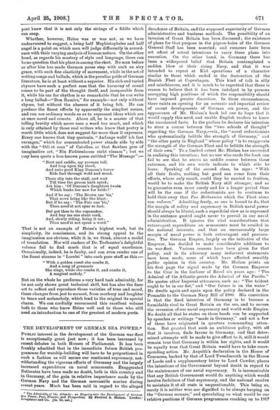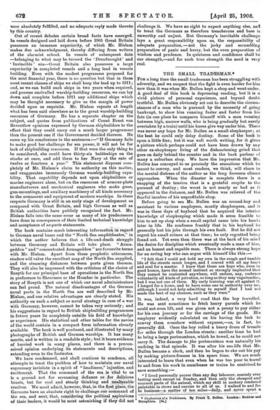THE DEVELOPMENT OF GERMAN SEA POWER.* PUBLIC interest in the
development of the German war-fleet is exceptionally great just now ; it has been increased by recent debates in both Houses of Parliament. It has been frankly admitted that in the immediate future British pro- grammes for warship-building will have to be proportioned in such a fashion as will secure our continued supremacy, not- withstanding the vigoroua,effortaof Germany and the largely increased expenditure on naval armaments. Exaggerated Estimates have been made no doubt, both in this country and in Germany, of the gain in relative importance made by the German Navy and the German mercantile marine during recent years. Much has been said in regard to the alleged
* The Admiralty of the Atlantic: an Bnotiry.into the Development of German Sea PiAger, Past, Present, -and- Prospective. By Percival A. Hialatn. London : Longman!' and Co. f6e. 65. net.] decadence of Britain, and the supposed superiority of German administrative and business methods. The possibility of an invasion of Great Britain has been discussed ; the existence of plans for that purpose in the pigeon-holes of the German General Staff has been asserted; and rumours have been set afloat of actual intentions to carry these plans into execution. On the other hand, in Germany there has been a widespread belief that Britain contemplated a. sudden blow at their rising Navy, and that it was intended to repeat at Kiel operations of a character similar to those which ended in the destruction of the Danish Fleet at Copenhagen. This kind of talk is silly and mischievous, and it is much to be regretted that there is reason to believe that it has been indulged in by persona occupying high positions of which the responsibility should have imposed greater discretion. In these circumstances, there exists an opening for an accurate and impartial review of recent developments of German sea power, and the appearance of Mr. Hislam's book led one to hope that it would supply this need, and enable English readers to know the uncoloured facts. In the preface he declares his intention to steer a course between the "two schools of thought" regarding the German Navy,—viz., the "naval reductionists who systematically belittle the strength of Germany," and "the other party in England" whose policy "is to exaggerate the strength of the German Fleet and to belittle the strength of their own." To a limited extent Mr. Hislam has succeeded in realising this intention; but no one who reads the book can fail to see that lie steers no middle course between these extremes, and his own words indicate to which side be leans. Speaking of the second class, he says : "With all their faults, nothing but good can come from their efforts, whose only result, could they be carried to fruition, would be to make the British Navy still stronger, and so to guarantee even more surely and for a longer period than will be the case if the reductioniets are to continue to hold their sway that Paz Britartnica which the Fleet alone can enforce." Admitting freely, as one is bound to do, that the margin of safety and supremacy in British naval power should always be liberal, such a superficial view as is expressed in the sentence quoted ought never to prevail in our naval administration. It ignores the vital considerations that extravagant expenditure on armaments must be avoided in the national interests, and that an unreasonably large margin of naval power is both extravagant and provoca- tive. The German Empire, largely on the initiative of the Emperor, has decided to make considerable additions to its war-fleet. Various reasons have been given for that policy, and in its advocacy many indiscreet statements have been made, some of which have affected sensibly public opinion in this country. Mr. Hislam prints on his first page the signal made by the German Emperor to the Czar in the harbour of Revel six years ago : "The Admiral of the Atlantic greets the Admiral of the Pacific." He quotes other Imperial utterances, such as : "The trident ought to be in our fist," and "Our future is on the water." He dwells again and again upon the policy declared in the Preamble to the German Navy Bill of 1900. His conviction is that the fixed intention of Germany is to become a formidable rival to Great Britain on the sea, and to secure the reversion of our naval supremacy and world-wide Empire. No doubt all that he states on these heads can be supported: by speeches or writings "made in Germany," and not a few of these have originated in quarters commanding atten- tion. But granted that such an ambitious policy, with all that it involves, finds favour in Germany, and that deter- mined attempts will be made to give effect to it, still it would remain true that Germany is within her rights, and it would be equally true that Great Britain would have to take corre- sponding.action. Mr. Asquith's declaration in the House of Commons, backed by that of Lord Tweedmouth in the House of Lords and a supplementary letter to Lord Cawdor, places the intentions of the Government beyond doubt in regard to the maintenance of our naval supremacy. It is inconceivable that any British Government would do anything which would: involve forfeiture of that supremacy, and the national resolve to maintain it at all costa is unquestionable. This being so,' surely it is neither wise nor dignified to be always harping on the "German menace," and speculating on what would be our relative positions if German programmes reaching on to 1911
were absolutely fulfilled, and no adequate reply made thereto by this country.
Out of recent debates certain broad facts have emerged. In vessels designed and laid down before 1905 Great Britain 'possesses an immense superiority, of which Mr. Hislam 'makes due acknowledgment, thereby differing from writers of the alarmist school. In vessels of subsequent date —belonging to what may be termed the 'Dreadnought' and ' Invincible' era—Great Britain also possesses a large superiority in completed vessels and a long lead in vessels building. Even with the modest programme proposed for the next financial year, there is no question but that in these most recent classes of ships we shall keep the lead up to 1911; and, as we can build such ships in two years when required, and possess unrivalled warship-building resources, we can lay down and complete before 1911 any additional ships which may be thought necessary to give us the margin of power decided upon as requisite. Mr. Hislam repeats at length what has been said elsewhere as to the great warship-building resources of Germany. He has a separate chapter on the subject, and quotes from publications of Count Ernst von Reventlow opinions expressed by German shipbuilders to the effect that they could carry out a much larger programme than the present one if the Government decided thereon. He sums up his conclusions in the sentences :—" If Germany fails to make good her challenge for sea power, it will not be for lack of shipbuilding resources. If that were the only thing to be considered, she could have thirty-six battleships on the stocks at once, and add them to her Navy at the rate of twelve or fourteen a year." This statement disposes com- pletely of Mr. Hislam's claim to authority on this matter, and exaggerates immensely German warship-building capa- bility. That capability depends not upon shipbuilders or marine engineers alone, but on the resources of armour-plate manufacturers and mechanical engineers who make guns, gnn4aountings, and auxiliary machinery of all kinds necessary to the armament and equipment of modern warships. In these respects Germany is still in an early stage of development as compared with Great Britain, and high German as well as British authorities have publicly recognised the fact. Mr. Hislam falls into the same error as many of his predecesson have done in consequence of their limited technical knowledge
and acceptance of ex-parte statements. '
The book contains much interesting information in regard to German naval bases and the "North Sea amphitheatre," in which the author believes that a life-and-death struggle between Germany and Britain will take place. "Arma- geddon" and" concentrated Armageddon" are favourite terms with Mr. Hislam. Apart from these prophetic utterances, readers will value the excellent map of the North Sea supplied, and the steaming distances between ports given thereon. They will also be impressed with the criticism of the choice of Rosyth for our principal base of operations in the North Sea in preference to Sheerness or the Humber in particular. The story of Rosyth is not one of which our naval administrators can feel proud. The natural disadvantages of the German naval ports in the North Sea are well described by Mr. Hislam, and our relative advantages are clearly stated. His authority on such a subject as naval strategy in case of a war with Germany, however, cannot be taken very seriously; and his suggestions in regard to British shipbuilding programmes in future years lie completely outside his field of knowledge or experience. His statistical and other tables for the navies of the world contain in a compact form information already available. The book is well produced, and illustrated by many photographs of British and German warships. It has many merits, and is written in a readable style ; but it bears evidence of hurried work in many places, and there is a precon- ceived opinion underlying its statements and descriptions, extending even to the footnotes.
We have condemned, and shall continue to condemn, all attempts to treat the problem of bow to maintain our naval supremacy inviolate in a spirit of "headiness," injustice, and excitement. That the command of the sea. is vital to us is a ground not for screaming defiance or or delirious beasts, but for cool and steady thinking and ,nnalterable• resolves. We must admit, however, that, in the first, place, the Germans have an absolute right to challenge.our command of the sea, and next, that, considering the political .aspirations of their leaders, it would be most astonishing if they did not challenge it. We have no right to expect anything else, an to treat the Germans as therefore treacherous and base is unworthy and unjust. But Germany's inevitable challenge lays a great responsibility upon us, the responsibility of adequate preparation,— not the jerky and scrambling preparation of panic and hurry, but the even preparation of wisdom and prudence. In quietness and confidence shall be our strength,—and for such true strength the need is very real.























































 Previous page
Previous page